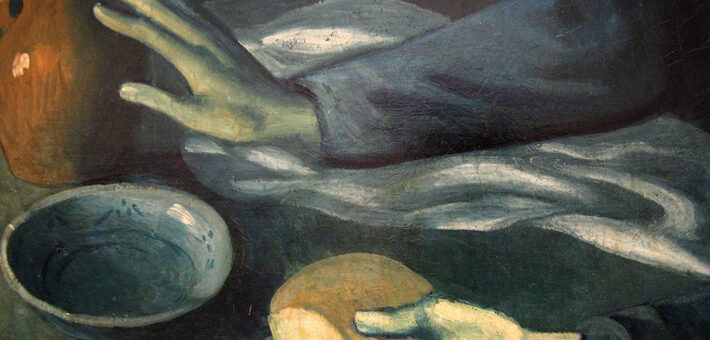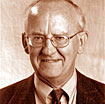Commentary on Proverbs 9:1-6
On the wall of the bedroom that my younger brother and I shared was a painting of a young boy standing at the wheel of a ship, piloting it through stormy weather.
In the background, unseen by the lad, was the figure of Jesus, guiding, standing by. Not a bad picture, I have thought, of Proverbs as a manual for navigation, but also of the hidden but steady guidance of God.
Just as Moses is associated with the Pentateuch and David with the Psalms, so Solomon is associated with Proverbs. He was legendary for his wisdom (1 Kings 3-4). Proverbs 1:4-5 indicates that while the materials are initially intended for the young, older and wiser people will also find much of value. The opening image speaks about learning the art of “navigation” (1:5; New Revised Standard Version, “skill”). Gerhard von Rad has wisely written:
“These maxims saturated as they are by experience, resemble buoys set out on the sea by which one can find one’s position. Herder says very shrewdly that one has not to learn “from” such maxims, but “with their help.”…And people had also to learn how to manage money, and their own bodies and — what was hardest of all — their tongue, which had no less than life and death in its power (Proverbs 18:21).” (Old Testament Theology I, 421,434)
Something I learned from Billy Graham
I remember discovering a column by the Rev. Billy Graham on one of the back pages of a Sioux Falls newspaper. I read through it, tore it out, and taped it alongside my desk in my office at the college where I was teaching. The column suggested as a discipline reading a chapter of Proverbs, which matched the number of the day the month. Since there are 31 chapters in Proverbs it worked very well — and at various times I have begun my teaching or preaching workday by reading the chapter of Proverbs for the day of the month. Thanks, Billy Graham.
In teaching Proverbs in an introductory Bible class for first-year college students, I discovered two things. First, almost none of them had ever encountered this book. Second, all I had to do was ask students to read through the book and pick out a favorite text to share with the other. I didn’t ever lecture on Proverbs. I simply let the texts do the work! The result was some of our liveliest classes and discussion, filled not only with appreciation for beauty and wonder (“Three things are too wonderful for me…” Proverbs 30:18-19) but also with down-to-earth common sense (“Even fools who keep silent are considered wise…” Proverbs 17:28).
So to avoid dealing with these texts as though they were individual pieces of popcorn, I suggest that you take Billy Graham’s suggestion and take time to read the chapter of Proverbs that matches the day of the month. You will then gain a sense for the individual sayings (“A soft answer turns away wrath” Proverbs 15:1) and also a feel for the longer essays (such as Proverbs 31:10-31) and even for the book as a whole.
The book of Proverbs
The book of Proverbs is a collection of essays, poems, and sayings expressing the wisdom of ancient Israel. Much of the material originated as folk wisdom, the kind of thing that circulated in the family or the clan. Thus a mother might say to a daughter, “A stitch in time saves nine” (in the equivalent Hebrew). Or a father might advise a son on a repair project gone awry, “Haste makes waste!”
After circulating orally, these sayings might be collected, polished, arranged, and re-arranged.
Two women: one foolish, one wise (Proverbs 8 and 9)
As was the case in Proverbs 1:20-33, wisdom is personified as a woman in Proverbs 8 and 9, perhaps reflecting an actual practice of women street preachers or teachers. What is truly astonishing about wisdom as described here is that wisdom is said to have been present at the time of “beginning” (the Hebrew resheet is the same vocabulary as “in the beginning,” the first word in the Bible). The creating activity of wisdom is described in Proverbs 8:22-31. The speech of “woman wisdom” ends with a declaration of the joys of those who find her (Proverbs 8:32-36).
Continuing with the theme of Proverbs 8, chapter 9 begins with two contrasting pictures, of Woman Wisdom and Woman Folly. Those who listen to the call of Woman Wisdom find life (Proverbs 9:6) while those who listen to Woman Folly end up as guests — in the depths of hell (verse 18)! In between these two pictures is a re-statement of the theme sounded in Proverbs 1:7, this time with the benefits of finding wisdom added (Proverbs 9:10-12).
At this point is the obvious connection between the bread and wine offered to hearers (Proverbs 9:5) with the bread and wine of the Lord’s Supper. The sermon would conclude with the image of life as a walk, journey or even a voyage (Proverbs 9:6). Proverbs will help the voyager learn how to steer the ship of life, discovering God’s guidance.
[Editor’s note: The author continues this four-part series on Proverbs in the semi-continuous First Readings for Sept. 9, Sept. 16 and Sept. 23, 2018.]


August 19, 2018